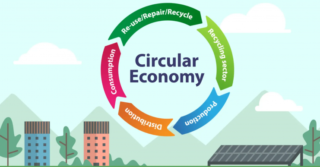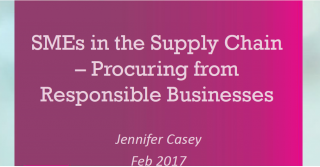Sustainable Supply Chain

The business case for the Circular Economy
In the first article of the series we defined Circular Economy as an economic model that attempts to decouple “economic activity from the consumption of finite resources.” We also discussed the history and background of the movements that led to its rise in popularity. This second article now looks at how that popularity has fostered C-suite and board level conversations in many of today’s top corporates,

What is the Circular Economy? BITCI explains
You might have heard the term “Circular Economy” and wondered what it means. It’s a fairly recent term meant to encompass a number of initiatives, philosophies, and movements (Cradle to Cradle, biomimicry, blue economy, regenerative design and others) that have been ongoing from the 1970s [1] . It’s based on the idea that the Earth has

Primark launches its first range of jeans made with 100% sustainable cotton
The range of women’s jeans will be available across the UK and Europe from €17 Important step towards Primark’s aim for all cotton used in their products to be sustainably sourced Primark’s sustainable cotton uses more natural farming methods, including minimising the use of chemical pesticides and fertilisers and reducing water consumption, as well as

Veolia commences major upgrade to the Vartry Water Treatment Plant
Global resource management company, Veolia, is now working in partnership with Irish Water to develop and operate a new 75 million litres per day water treatment plant at Vartry, Co Wicklow. Designed to meet the growing and future needs of the population of Dublin the new plant will secure the existing supply and forms part

Musgrave MarketPlace
Musgrave MarketPlace, Ireland’s leading wholesale supplier to retail, foodservice and SME businesses has invested significantly in the brand over the past two years which has seen Musgrave MarketPlace continue to redefine wholesale on the island of Ireland. Musgrave believes that everyone has a responsibility to leave a positive impact on the world around them and

SMEs in the Supply Chain – Procuring from Responsible Businesses
On 2nd February, BITCI held a workshop with its members to discuss the intersection of two topics – sustainable procurement and Small to Medium Sized Enterprises (SMEs). Regardless of the type of business you are, you’re likely spending sums of money annually on products and services offered by SMEs – be it gardening

Stimulating Businesses and the Economy: Supplier Diversity Programmes
Business in the Community Ireland (BITCI), as the network for responsible business, identified a growing trend of large companies undertaking initiatives that support Small to Medium Enterprises (SMEs). Hence it undertook preliminary research to explore this topic in more detail to uncover exactly the types of initiatives large companies are carrying out to support SMEs

Stimulating Businesses and the Economy: Examples of companies’ initiatives to support SMEs
Business in the Community Ireland (BITCI), as the network for responsible business, recognised a growing trend amongst its members of initiatives being implemented that are aimed at supporting Small to Medium Enterprises (SMEs). These initiatives aren’t driven solely by Business-to-Business (B2B) companies who would potentially have SMEs along their supply chains as both customers and

Stimulating Businesses and the Economy: Business Case & How To Set Up Initiatives To Support SMEs
Business in the Community Ireland (BITCI), as the network for responsible business, identified a growing trend of large companies undertaking initiatives that support Small to Medium Enterprises (SMEs).